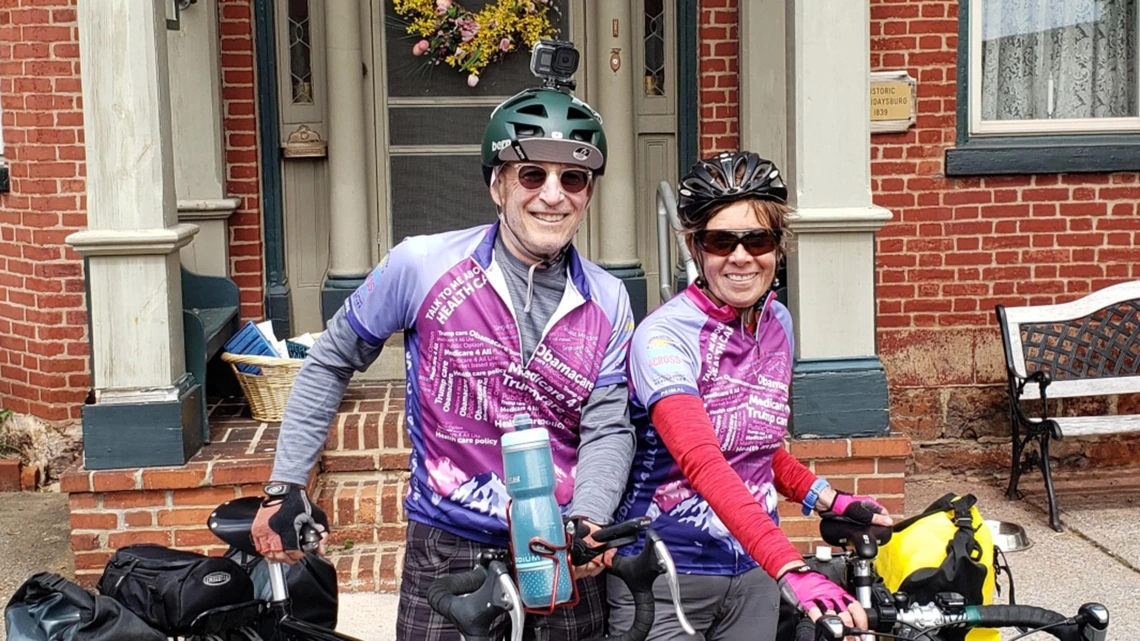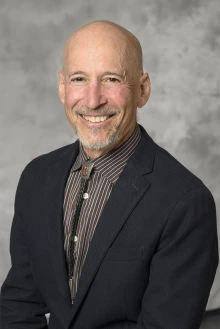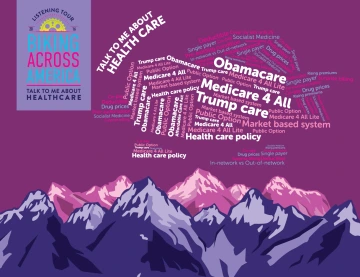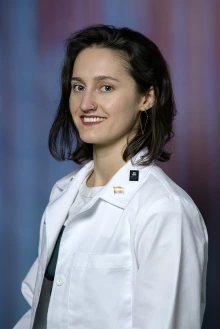Health Sciences Faculty Member Embarks on Pandemic Listening Tour
Dr. Paul Gordon is on a bike listening tour to learn what Americans think about health care.

College of Medicine – Tucson professor Paul Gordon, MD, MPH, and his wife, Eve Shapiro, MD, emeritus professor of pediatrics, begin their ride in May in Hollidaysburg, Penn.
Paul Gordon, MD, MPH aims to spend the summer learning how a global health crisis affects people’s opinions about health care policy.

Paul Gordon, MD, MPH
Dr. Gordon is a tenured professor in the College of Medicine – Tucson’s Department of Family and Community Medicine. Following up on a similar listening tour in 2016, he started his second cross-country bike tour in State College, Penn., in mid-May, riding to various small towns in Ohio.
As he rides across the country, he hopes to engage people’s thoughts on health care access and policy, prompted by his riding jersey and open-ended questions.
This month he is being joined by first-year medical student Julia Liatti for her summer research project. They will talk with people as they ride through Detroit, the upper peninsula of Michigan, Ironwood, Wisc., and on to Fargo, North Dakota. They planned the bicycle tour across the northern states to hear from rural residents in swing voting states or politically conservative areas that voted for President Donald Trump.
“It’s about listening to voices that aren’t heard and trying to understand how they understand health care, and how their understanding of health care influences what they do,” especially in the upcoming election, Dr. Gordon said before he left Tucson on the trip.
Health Care in Politics and a Pandemic
Dr. Gordon’s first bike listening tour was during the 2016 presidential campaign, when he set out to listen to people’s thoughts about the Affordable Care Act, a central point of contention between the political parties that year.

Paul Gordon, MD, MPH, wears a jersey printed with a health care word cloud that says "talk to me about health care."
With the advent of the global coronavirus pandemic, Dr. Gordon knows that event will shape what he hears on the road. It has also changed his approach from 2016, eliminating large gathering spots like community centers and diners from his itinerary.
He and Liatti will likely use supermarkets and gas stations as their conversation points. But even if they find people, there are other hurdles.
“The most central part of this work is gaining people’s trust so that they’ll tell me their thoughts and stories," he said.
"I fear with social distance and a mask, that trusting relationship is going to be more challenging to create,” Dr. Gordon said.
Shaping A Future Physician
For this year’s listening tour, first-year medical student Liatti is joining him.
Liatti was one of the first group of students selected for a Primary Care Physician scholarship earlier this year. The Health Sciences scholarship is funded by the state and covers tuition for students who commit to practicing a primary care profession in an underserved area of the state. She says it’s important for her to learn how people understand health care and health policy.

First-year medical student Julia Liatti.
“Especially with all the politics going on around it, and the election, how is it that people understand what health care is, and how it’s structured, and what’s available to them?” she said. “And then how does that affect me going forward in terms of educating patients without being seen as political proselytizing but just trying to help them navigate this really confusing system?”
As an aspiring primary care physician, she says she knows it’s important to learn about the people she will serve.
“I really need to understand all the ways that the bureaucracy of medical care in this country affects people’s decisions,” Liatti said.
The trip will be her summer research project, required of all first-year medical students as they transition to their second year. Dr. Gordon also plans to write about his conversations for publication again this time. In addition to numerous news articles about his trip in 2016, he wrote three articles based on his interviews for the journal Academic Medicine.

